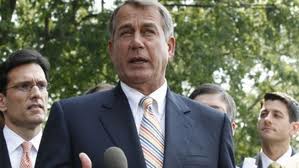Yesterday, the House of Representatives took a “symbolic” vote on raising the debt ceiling without any “strings attached” – i.e., the trillion dollars worth of spending cuts the Republicans are insisting on before they’ll agree to raise the debt ceiling.

The vote went how it was supposed to go: not a single Republican voted for the bill, and Democrats split almost down the middle on it.
It makes perfect sense for Congress to ask for some guarantee of future fiscal discipline when they’re being asked to allow the U.S. to go deeper into debt. Interest alone on that debt cost $414 billion last year. But the spending cuts the Republicans are demanding could be far more painful than the last round.
Rep. Paul Ryan, Vice President Joe Biden and other big figures in the debt ceiling debate aren’t talking a lot about transportation, but that doesn’t mean the sector doesn’t have a significant stake in the outcome. Transportation will be dramatically affected both by the debt ceiling itself and the strings-attached spending cuts.
First, the Debt Ceiling
Everyone pretty much agrees that the debt ceiling needs to be lifted. If it’s not, the U.S. will default on its debts and worldwide financial pandemonium will ensue. But does it make sense to keep deficit spending, particularly on transportation?
That’s what we’ve been doing, after all. As the Highway Trust Fund balance drops, the U.S. keeps spending more on transportation than it brings in. As Streetsblog has been saying throughout the reauthorization debate, we can either raise new revenue (most likely by raising the gas tax), we can lower spending to levels that would starve our transportation agencies, or we can take money from the already-stretched general fund.
In order to keep repairing our bridges and running transit services, Congress has given the Highway Trust Fund a series of infusions from the general fund – basically, deficit spending. That can’t continue if we don’t raise the debt ceiling.
Of course, we don’t want it to continue. Transportation agencies should be more accountable for the money they spend and should have to prove that the projects they fund are achieving the goals that were established. That’ll help. But we’ll still need to spend more for transportation than we have right now.
The long-term solution, as we’ve often said, is raising the gas tax or shifting to different revenue streams. By refusing to raise the debt ceiling and cutting off all future deficit spending, Congress can force the issue of raising revenue by eliminating the possibility of general fund transfers. There would be no choice but to raise transportation revenues or cut transportation spending. Even without that dramatic backdrop, the House has indicated its preference: it's flat-out refused to either raise revenue or borrow from the general fund to pay for the new transportation bill, preferring instead to reduce spending to dangerously low levels.
Next: Spending cuts
House Budget Chair Paul Ryan’s proposed 2012 budget calls for cutting the transportation budget by about a third. That budget is the GOP’s starting point for the delicate negotiations ongoing between the two parties in an attempt to come to some kind of compromise on spending cuts that will convince Republicans (and those 82 holdout Democrats) to vote to raise the debt ceiling. In other words, transportation policies could become bargaining chips in the larger battle over the debt ceiling.
Ryan’s budget didn’t have a lot of details in it about exactly what would be axed from the transportation budget. We can imagine some of the more vulnerable and controversial projects would be on the list, including livability programs, TIGER, and all those “hitchhikers” onto a Highway Trust Fund Republicans maintain should be just for highways – hitchhikers like transit and bicycle infrastructure.
Last night’s vote was just the Republicans’ way of setting the stage for the fight over spending cuts, a way of proving that a debt ceiling raise without spending cuts is a non-starter. Once the theatrics are over, we’ll be watching to see what concrete actions the bipartisan negotiators come up with.





